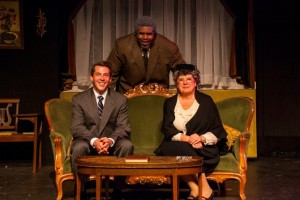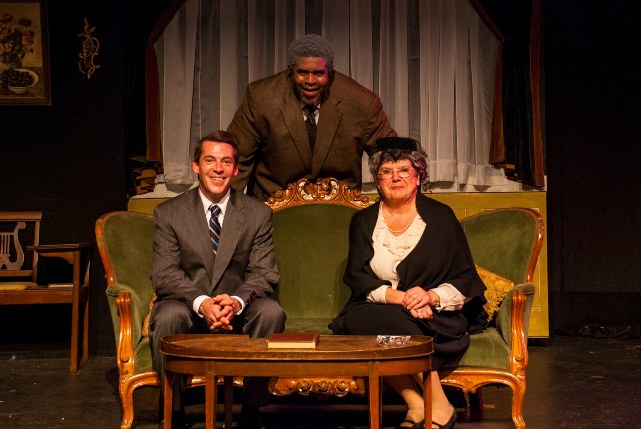Odd-couple type relationships always make for an engaging show premise, especially when the two steadfast characters are portrayed with such chemistry and buoyancy. The volley of wits between an unlikely pair: the Southern, white, Jewish Miss Daisy Werthan, (played by Susan Dewey), and her enthusiastic yet uneducated African American chauffeur, Hoke Colburn, (played by an honest and charming Michael Leland), take center stage at New Candlelight Theatre June 8th through 23rd.
New Candlelight truly is an institution in Arden, and upon each visit there I’m reminded of what a staple it is of the community (not to mention a great opportunity for a pretty comprehensive evening out: dinner and a show.) Veering from the typical dinner theatre set-up of most performances, a dessert buffet only is offered prior to curtain from 6 to 7:30pm, included in the $25 ticket price. As with other NCT shows, a cash bar and free parking are available.
Sweet but not sappy, DRIVING MISS DAISY opens in 1948 in Atlanta, Georgia, right after Miss Daisy has crashed her car for what appears to be the umpteenth time. Her adult son, Boolie (the only other actor in this three-actor work,) played by an enthusiastic and clean-cut Robert Miller, tells his mother he will be hiring a chauffeur to “run her around to the store.” Despite her vehement resistance, Daisy finally gives in and the remainder of the plot centers around the softening of Daisy’s heart and the mutual education of Daisy and Hoke as the two help open each others’ eyes to the ever-changing world. Daisy, a former school teacher, teaches Hoke to read as he, in turn, breaks her of her occasionally narrow –minded and curmudgeonly ways with his own brand of wit and honesty.

The cast of DRIVING MISS DAISY at New Candlelight Theatre: (seated on couch, l-r) Bob Miller (Boolie), and Susan Dewey (Miss Daisy); (standing behind couch) Michael Leland (Hoke).
It is a feat in any production to attempt to portray the aging of these characters by 25 years (as the show spans from 1948 to 1973), but Dewey (Miss Daisy) and Leland (Hoke) respectively play these transitions seamlessly. In perhaps the most touching moment of the play, Hoke comforts Daisy as she has what seems to be an Alzheimer’s-like episode and begins to think she is back in her classroom, frantically searching for her students papers to grade. When she regains her clarity, she shares with Hoke that he is her best friend- the first time the audience sees her open up and share her need for companionship. As the character of Daisy is so stubbornly independent throughout, the sweet vulnerability that Dewey brings to the character in this moment, and a few others throughout the show, is quite engaging to watch.
Leland is slightly young for the part of Hoke, but the demeanor, dialect, and truthfulness that he brings to this role is captivating. This adds considerably to the dimensions of Hoke and Daisy’s relationship. He shines most exceptionally in the moment when he shares with Daisy the terrifying and heart-breaking story of how his friend’s father was lynched, after explaining to Daisy that her temple had been bombed: a truth that Daisy, at first, refuses to believe. Rooted in history (Daisy attends a dinner honouring Martin Luther King), the story plays out credibly and believably as the two spend their days together and continue to learn from each other, even remaining connected through Miss Daisy’s admission into a nursing home.
Despite a very slight lighting hiccup, the production team is to be commended overall. The soundscape of the production was spot-on and complimented the fairly simplistic set, as the scenes shifted from stage left to right. Two small benches represented the car, as the three actors mimed entering and exiting the vehicle. As this was executed well, the representational scenic elements proved effective, in addition to a more realistic half-stage set used for Miss Daisy’s home.
The play is a touching tribute to unlikely friendships and what can be gained by letting someone unexpected into one’s life. Exceptionally presented by the NCT team, this dessert theatre experience is not to be missed. Performances are Saturday evenings and Sunday afternoons; with one Friday evening performance on June 21, 2013. Evening shows: Doors open at 6pm, show starts at 7:30. Afternoon shows: Doors open at 1pm, show starts at 2:30. Runs through June 23rd.
DRIVING MISS DAISY
by Alfred Uhry
Directed by Bob M. Kelly
Assistant directed by Betsy Conner
June 8 – 23, 2013
New Candlelight Theatre
2208 Millers Rd.
Wilmington, DE 19810
(302)475-2313
www.nctstage.org/


